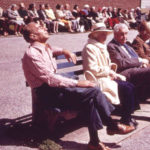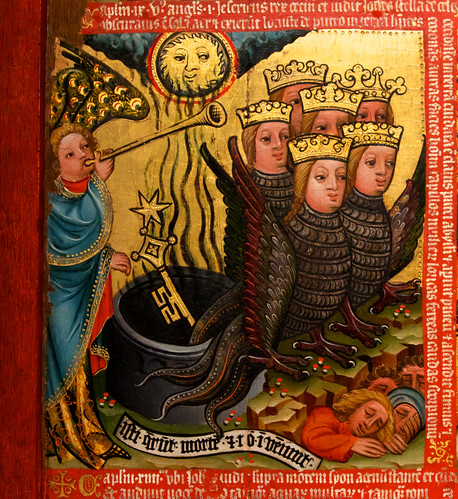We run our website the way we wished the whole internet worked: we provide high quality original content with no ads. We are funded solely by your direct support. Please consider supporting this project.
On the Language of “Revolution”
Question: The banner of your website and the thrust of much of your teaching focuses on “revolution.” While I can see a radical call in some of the sayings of Jesus, especially if he were addressing upper-middle class North Americans, I wonder if attaching revolutionary language to his teaching seems a stretch. He did not join with the Zealots of the day. He said to his captors, “Am I leading a rebellion, that you come at me with clubs and swords?” Revolutionary culture is connected with all sorts of movements, many stemming from the Enlightenment and communism that seemed to embrace ideologies of autonomy and methodologies of violence. That seems to conflict with the spirit of your own communitarian and pacifist teachings. Could you explain why you use revolutionary language?
Answer: I understand your concern about the world’s association of revolution with violence and social upheaval etc. Jesus’ kingdom certain wasn’t that. At the same time I think that the Kingdom inaugurated by Jesus was far MORE revolutionary, not less, than common examples of revolution, whether the American, French, or Russian. Everything Jesus did revolted against aspects of the culture and creation that weren’t consistent with God’s will, and thus revolted against the principalities and powers that (in a first century apocalyptic context) were believed to be behind those aspects of society and creation. And he revolted, ultimately, by not only refusing to hate his enemies, but instead to love and bless his enemies, which is the opposite of the world’s way of revolting. So I want to reclaim the most radical “revolt” word we have available and redefine it within the kingdom. This word is revolution.
The same objection has been raised about my “spiritual warfare” language, and I give the same response, since warfare language permeates the Bible, including the NT.
The Bible has a great example of using revolution/warfare language and turning it on its head to mean the opposite of what it means in the world. It’s found in the book of Revelation. John employs dozens of violent symbols from the OT and apocalyptic literature of his day and he turns them on their head to mean the opposite. [I’m in the middle of preaching a six week series on Revelation right now]. So I feel there is biblical warrant for doing the same today.
Nevertheless, you are concerned about the right things, and it just means we have to make an extra effort to be sure we are communicating the kind of revolution and warfare that is consistent with the revolution and warfare of the cross. The cross defines the revolution.
Blessings,
Greg
For more on the topic of revolution, see Greg’s book Myth of a Christian Religion: Losing Your Religion for the Beauty of a Revolution. This book introduces 12 ways that the revolution should stand against the principalities and powers of the world.
For the sermon series that was the precursor to this book, click here.
For the recent sermons from the series Rescuing Revelation where I outline how God takes revolutionary language and turns it on its head, click here.
Category: General
Tags: Enemy Love, Kingdom, Love, Non-Violence, Pacifism, Revelation, Revolution, Viva la Revolution!
Related Reading

Podcast: Who is Allowed to Kill and Who Isn’t?
How could it have been ‘just’ to Kill Hitler but also not something a Christian should do? Greg wrestles with non-violence in a world where God uses the violence of others for his own will. http://traffic.libsyn.com/askgregboyd/Episode_0360.mp3

Quotes to Chew On: Religious Violence
“The myth of religious violence promotes a dichotomy between us in the secular West who are rational and peacemaking, and them, the hordes of violent religious fanatics in the Muslim world. Their violence is religious, and therefore irrational and divisive. Our violence, on the other hand, is rational, peacemaking, and necessary. Regrettably, we find ourselves forced to bomb them into the higher rationality.” ~William Cavanaugh,…

Knowing and Experiencing God
The way we view God is in part conditioned by the state of our minds and hearts. Origen put it this way: “[T]he Holy Spirit addresses our nature in a manner appropriate to its imperfection, only as far as it is capable of listening.”[1] In fact, Origen went so far as to argue that the…

Mother’s Day
Alain Bachellier via Compfight Happy Mother’s Day to all of our beautiful, luminous ReKnew moms and moms-to-be! And comfort and love to those who grieve lost children this Mother’s Day. You’re in our hearts and prayers.

The Politics of Jesus
Many are so conditioned by the mindset of the world that they can’t even envision an alternative way of affecting society and politics other than by playing the political game as it is done by the established governmental system. Some thus conclude that, since Jesus didn’t try to overhaul the political systems of his day…

What Jesus Revealed About Being Human
According to the creation story, when Adam and Eve ate the fruit, they essentially ceased being the wonderful, God-centered, God-dependent human beings the Creator intended them to be. They became less than fully human. Instead, they began using everything and everyone in the world as surrogate gods, trying to get from people, deeds, and things…

